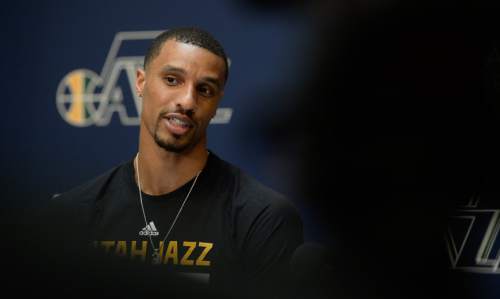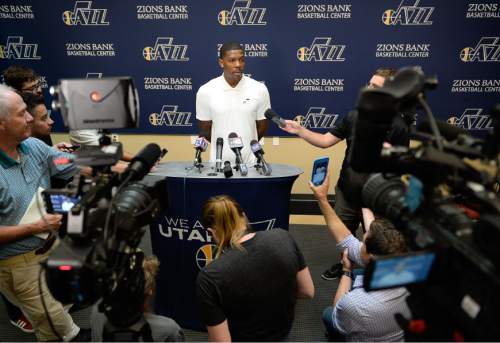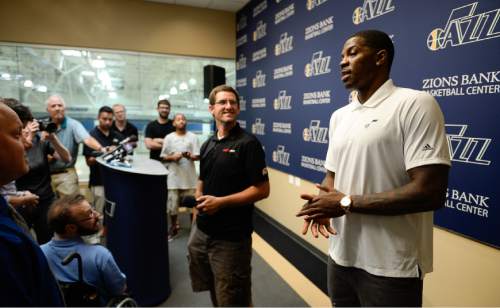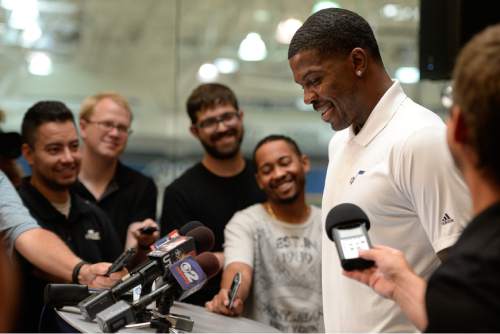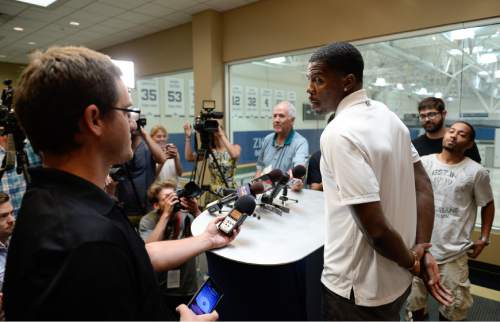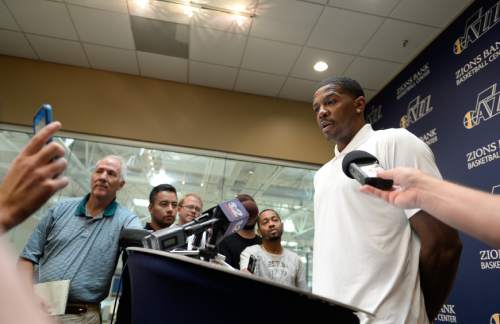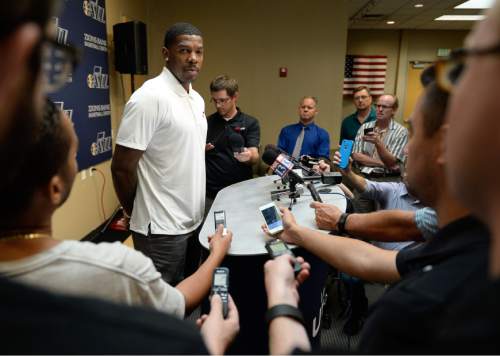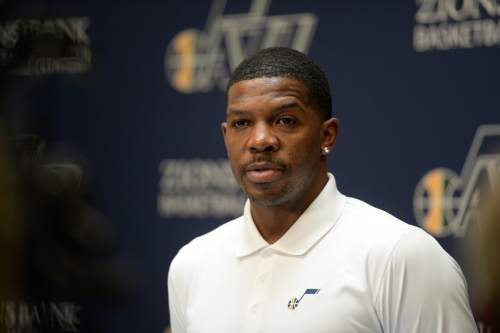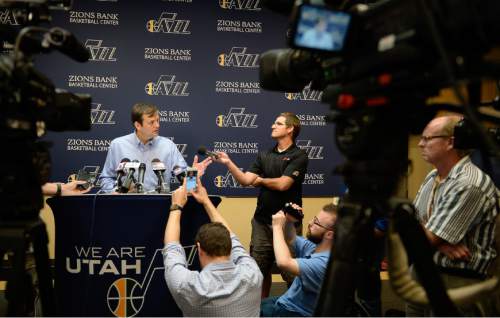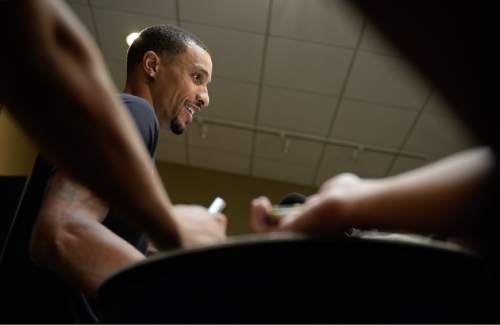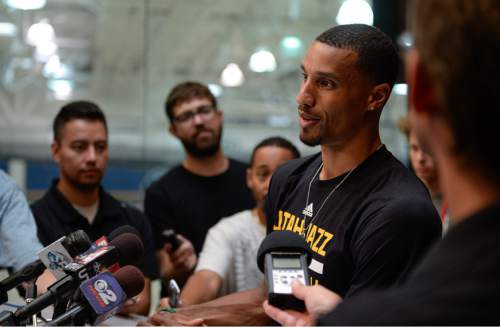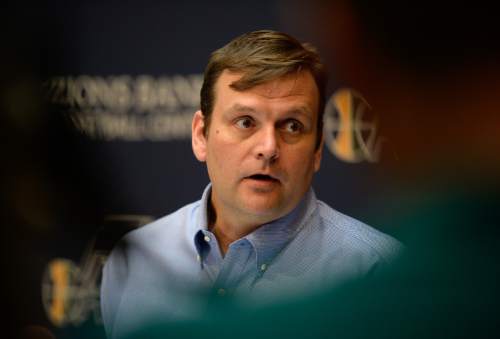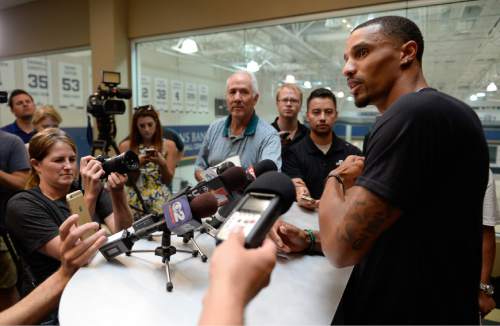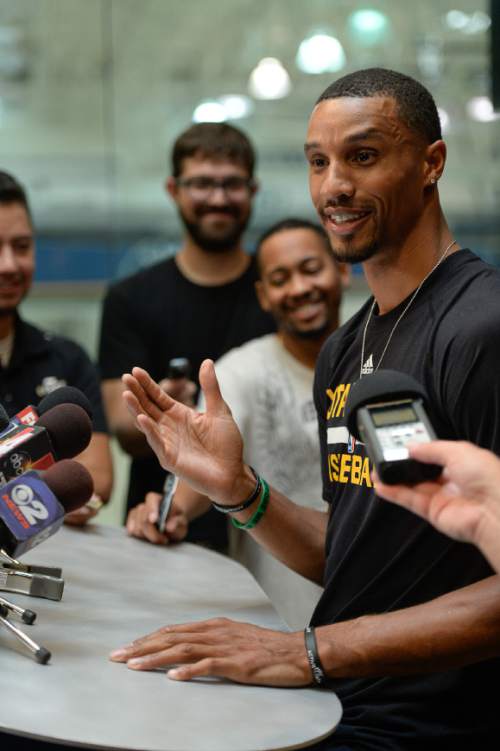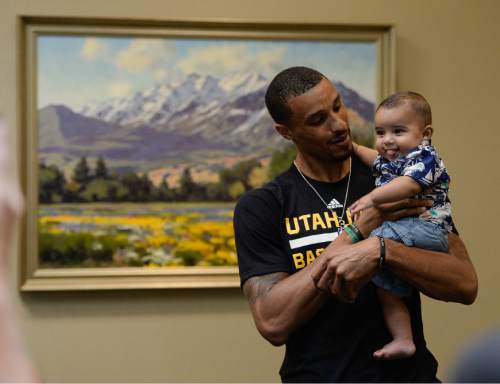This is an archived article that was published on sltrib.com in 2016, and information in the article may be outdated. It is provided only for personal research purposes and may not be reprinted.
New Jazzman Joe Johnson doesn't remember posing for the photograph with one of his young fans.
"That was quite some time ago," he chuckled.
Now the 35-year-old Johnson is excited for the possibility of backing up the nervous kid in the photo: Jazz wing Rodney Hood.
New Jazz point guard George Hill, meanwhile, is looking forward to catching up with Gordon Hayward, a fellow Indiana native whom he has watched since Hayward was a sophomore in high school.
After his team fell just short of a playoff berth last April, Utah Jazz general manager Dennis Lindsey went looking for veteran leadership who could help a young team take the next step in its evolution. Maybe it shouldn't be a surprise then that his acquisitions already have experience looking out for and being role models to some of the Jazz's young stars.
"[I am] a veteran guy who can come in and help lead these guys in the right direction. … I've been around the block, man. I've seen pretty much everything," Johnson said Friday as he and Hill met with reporters at the team's Salt Lake City practice facility.
The Jazz also officially announced the acquisition of forward Boris Diaw in a trade with the Spurs that also netted a 2022 second-round pick and cash considerations in exchange for the Jazz's rights to guard Olivier Hanlan.
In those moves, the Jazz have gotten older, wiser, deeper and more versatile this offseason. And now it will be on Johnson, Hill and Diaw to help ensure that the Jazz have gotten better.
"I've been there seven out of my eight years in the NBA," Hill said. "Joe's had a lot of success in the playoffs and Boris has won a championship. You're bringing in a couple great veterans to help this team."
The Jazz finished 40-42 last season and went 11-21 in games that were within three points with a minute left on the clock, a stat that Hill brought up multiple times in his introductory press conference.
"They were just missing a couple leaders down the stretch," he said.
Lindsey, meanwhile, is thinking how his bolstered roster can starting recording more blowout victories to avoid that issue altogether.
The Jazz should be much deeper this season than last, when they relied heavily on former D-League call-ups to try to weather their myriad injuries.
"I think we're improved," Lindsey said. "I think we're better able to manage a season with the depth. We didn't manage last season very well because of injuries."
Johnson, Hill and Diaw should also raise the team's talent level, creating desirable competition for playing time. And with all three capable of playing multiple positions, Jazz coach Quin Snyder should have the versatility to play big, match up small with Johnson at power forward or even invert, with Diaw orchestrating the offense from the top of the key while playing the center position.
All three acquisitions should find some comfort and familiarity in Utah. Diaw, who is currently playing with the French national team, is already friends with center Rudy Gobert. Johnson said he received high praise about the Jazz and Salt Lake City from friends Paul Millsap and Marvin Williams. And Hill, who already spent about four days earlier this summer helping a friend out at a Lone Peak High School basketball camp Utah County, knows Lindsey and Snyder from their time together in the Spurs organization.
Lindsey sees a cultural fit with the new players and the existing ones and Hill should be able to bring vocal leadership, something the young Jazz have lacked at times, to the locker room.
"I've never been the type that was scared to speak my mind to teammates," he said. "I feel like if we're teammates, we're family. We should be able to talk to each other like men. … I'm not scared to tell people if they're not doing what they're supposed to do, and I'll be sure to tell these guys don't be scared to tell me what I'm supposed to do, to light a fire under my butt."
All three players are in their 30s, with Johnson becoming the Jazz's elder statesman at age 35.
But the Jazz's offseason has been lauded by most pundits because they have added shooting and experience to their roster, and they have done it without taking on overly long contracts. Hill is in the last year of his contract. Diaw has two years left, including a team option, on a $13.5 million deal. And Johnson agreed to a two-year, $22 million deal to join the Jazz. That should give them flexibility next summer and the summer after as their younger players come due for raises.
On Friday, Lindsey said the Jazz likely are done with major moves, pleased with the results of a busy offseason already.
And come April, he hopes his time might be in a different spot.
"We're hopeful when those higher moments come, some of our young players can look the veterans we added for a sense of guidance," Lindsey said.
Twitter: @tribjazz


